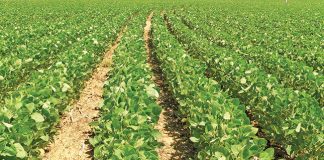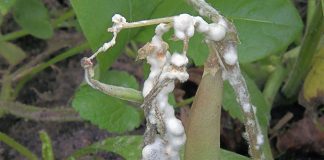
Photo: Supplied
At 28 years of age, Hlobi Yende demonstrates the energy and aspirations of her generation.
A confident, influential and competitive millennial, she has added several successful divisions to the family farm in the three years since she swapped her city shoes for gumboots.
READ How to keep the family business in business
And while her plans for the future seem even more daring, her track record speaks of a woman that perseveres to the end, pivoting when obstacles block her way.
As director of The Yende and Partners (Pty Ltd), in Ratanda, near Heidelberg in Gauteng, she is responsible for the day-to-day running of the 1 064ha farm.
The main commodities are 120ha of maize as well as butternuts, cattle, sheep and goats. She recently added beekeeping to aid pollination and income through honey sales.
Yende has five brothers but is the sole sibling managing the business. While she always enjoyed spending time on the farm, farming was not her first choice for a career.
But when all five brothers turned down the opportunity to join their father, Charles, on the farm, Yende realised that if she did not step in the farm would end at the second generation.
“I wanted to thank him for everything he did for us children – he always strived to give us the best – and joining him on the farm was my way of saying thank you,” says Yende.
She notes that passion is a prerequisite for success.
“Farming is hard work and money does not come easy. So if you don’t enjoy it, you will find it difficult to persevere. The more time I spend on the farm, the more I enjoy it and see more opportunities. It is such a fulfilling profession and I am so happy to have been given this opportunity.”
Knowledge is power
As a third-generation farmer, Yende has the benefit of generational knowledge and she is quick to acknowledge the role of previous generations in her success.
“Everything I know today I have learnt from my grandfather and father. My father still serves as my biggest mentor and guides me through this journey. We make a good team,” she says.

To be the best team player for her father, Yende has ensured she arms herself with the kind of knowledge that aids decision making.
While her degree in social sciences, obtained prior to joining the farm, is not without worth, having the know-how when negotiating prices has required extra learning.
“Being young is a hurdle on its own to overcome in the farming space, and being female is yet another. There is an expectation that you need to be male and in your 60s to be taken seriously, or unscrupulous people will try to take advantage of you.”
To this end she took a junior livestock judging course to sharpen her eye when selecting animals. “Now I know what to look for when buying animals on auction, so no one can overcharge me, or underpay for my animals when buying from me.
READ Get ready for the auction to achieve the best results
“I am also better at negotiating prices for my crops and payment terms after doing an MBA through the Gordon Institute of Business Science. Learning on the job is also immensely important. One must take responsibility to upskill oneself, keep learning and surround yourself with people who are experts, in order to succeed.”
She says obtaining funding has been problematic. Up until last year, the farm was rotating the maize crop with soya bean, but to obtain greater efficiencies a combine harvester is required to manage both.
This requires financing. “Banks don’t believe that a young girl can run a farm properly. I need to overexplain myself constantly within the industry, whereas anything my father says is just taken at first word. But I do believe the landscape is slowly changing as there are many new young, female farmers coming into their own, and changing perceptions.”
Additions that work
The Yende and Partners’ livestock component consists of 120 Kalahari Red and Boer goats, 100 meat Merino sheep, and 200 Simmentaler and Brahman cattle.
She notes that feedlots are especially fond of Simmentaler cattle as they provide heavy weaners.
She is currently investigating the possibility of adding Bonsmara cattle into the mix since they are also in high demand, and is working towards becoming a stud breeder in her own right.

Wool is another addition Yende is investigating, but she cautions that jumping into another division should not be done without thorough research.
“I don’t want to undertake anything that I am not fully prepared for, and which I don’t fully understand. Wool has its own challenges, and I need to be fully confident that I can handle everything before delving into that direction.”
Yende supplies the nearby Karan Beef feedlot and does meat processing and delivery for individual clients. She notes that having quality and biosecurity measures in place has assisted her in getting offtake agreements for her meat and butternuts.
READ Biosecurity measures on an animal farm
When the borehole pump was stolen, Yende was quick to find a solution where they could cope without irrigation water.
“I looked at the farm and realised there was more I could do. I wanted to be planting something while we were harvesting so that there would be income all year round. Planting butternuts was an ideal solution because they can be farmed dryland, and have a good market.”
In the first year she planted butternuts she achieved a yield of 40t on 1ha, which was far greater than she anticipated considering there was no irrigation available.
She has since secured an offtake agreement with two supermarket chains, and will plant an additional hectare this year.
She admits that integrating butternuts was a big shift in thinking for her and Charles, but says optimism always trumps pessimism.
“Instead of fixating on what will happen if something doesn’t work, I think about what will happen if it does!”
Her current focus is to get the irrigation system replaced so that she can produce more consistent butternut quantities and expand her market. With irrigation, she will be able to double her butternut production.
With her constant focus on new opportunities, it was not long before she realised the blue gum trees surrounding the farm could be put to good use.
She did a beekeeping course and is in the process of setting up hives on the farm. This will ensure better pollination of her butternuts and provide extra income through honey and beeswax products.
Yende says that when looking at diversification options, she seeks those that will complement current operations and where possible, provide passive income.
“This way I can still concentrate most of my energy on the core aspects of the business while increasing my income.”
The next generation
Being the proverbial ‘odd one out’ at most farmer gatherings is not lost on Yende and she is doing her share to give other young women an opportunity to learn.
The Yende and Partners offers agricultural students the opportunity to gain practical training on the farm.
While initially students were mostly male, Yende noticed that more and more females were knocking on her door.
“Many said they struggled to find placement since dynamics were geared for males. So I decided to make our programme female only, so that women could feel safe here and get the training they require to graduate. Being taught by a woman also shows them that it is possible to succeed in this male-dominated world.”
READ Great managers can work miracles
She has two students who shadow her to learn the ins and outs of farming. Her efforts won her the Training Initiative Award at the South African Agricultural Awards held in June 2023.
The benefit however goes both ways and Yende notes that, just as the students learn from her, she learns from them.
“They all come with their own set of knowledge and energy. Furthermore, when they see they are included in the business, they start taking ownership and go above and beyond in helping on the farm. So it is a win-win for all of us.”
Yende is in the process of accrediting the training she provides so that students walk away with more than just experience and can show an additional certification as well.
Her dream is to grow this segment into a fully fledged training centre, empowering youngsters with the knowledge and experience to farm successfully.
She has plenty of ambitions for the farming business, and is full of confidence that through hard work and research she will achieve her goals.
“Both my grandfather and father always said that if you know how to farm you will never go hungry. It’s a slow but sure business, and there are always opportunities.
“I’ve had to learn much patience since becoming a farmer because there is so much that is out of your control. But I have found my purpose in farming. It is not easy but it is fulfilling.”
Email Hlobi Yende at [email protected].













